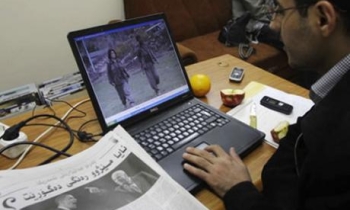MOSCOW -- A popular Kazakhstan newspaper owned by the former son-in-law of President Nursultan Nazarbayev was forced to close last week, its editors said, and was replaced with a new, similarly styled weekly run by a man close to the president. The switch is the latest chapter in a murky family feud that has brought Kazakhstan's commitment to democracy under increasing foreign criticism.
Several editors of Caravan, a weekly tabloid with a circulation of about 150,000, said in interviews that they were informed Monday that their printer would no longer produce the newspaper and that their landlords were evicting them from their offices.
In the meantime, a new company run by Zhanay Omarov, former press secretary for Nazarbayev, has moved into empty office space above Caravan's newsroom in Almaty, the editors said. The company has hired away most of Caravan's 800 employees and set to work on a paper of its own.
The first issue came out Friday under the masthead "We Choose Caravan, Caravan Chooses Us" and with a front-page design nearly identical to the old newspaper's. The new editors say their actions were legal and stemmed from mismanagement by Caravan's original leaders; other journalists see the move as a violation of property rights and freedom of speech.
"This is barbarism, this is simply shameless thievery in broad daylight," Galina Dyrdina, an editor at Respublika, an opposition newspaper, said by telephone from Kazakhstan. "A newspaper isn't just a business, it's intellectual property."
The original Caravan was part of the Alma Media publishing company, co-owned by Rakhat Aliyev, the ex-husband of Nazarbayev's daughter. During the marriage he built vast wealth in business, aided, many in Kazakhstan believed, by his connection to the presidential family. After Aliyev had an apparent falling-out with the president, Kazakh prosecutors charged him in May with involvement in kidnapping and organized crime, while he was on a diplomatic posting in Austria. Aliyev denies the charges. He was served with divorce papers in June.
On Wednesday, Austria refused to extradite Aliyev to Kazakhstan, saying he would not get a fair trial. The move was a rebuke to a government that has tried to depict itself as a Westward-looking democracy.
In May, Aliyev published a letter in Caravan claiming he was being persecuted by the Interior Ministry. Shortly after, a court agreed to shut down Caravan and a television channel also run by Aliyev. Caravan's editors said they struck a deal in which they promised to give up day-to-day editorial control, and to stop mentioning the case. In exchange, publication could continue.
That effectively gave the government de facto control over Caravan, according to its editor, Alexander Shukhov, who has run the paper from Vienna for the past six years. In the meantime, Caravan's old editors say, the authorities hatched a plan to establish legal control. "Rather than storming the castle, they decided to build a new one," Shukhov said in an e-mail.
In a telephone interview from Kazakhstan, one of Shukhov's deputies, Georgy Kovalev, described walking into what had been empty sixth-floor office space Monday evening and discovering many of his employees furtively working on a newspaper that, he said, is a shameless duplicate of the old Caravan.
"You know, journalists are used to sharing secrets and such, and I was always well-informed about what the staff was up to," Kovalev said. "And honestly, when I finally found out about what was happening, I simply didn't know what to think."
Kovalev and another former deputy editor, Alexandra Kan, e-mailed photos of the new and old versions of Caravan to The Washington Post. On both, the word "Caravan" is in large type on the nameplate, with a yellow background and a red border.
In explaining the change to Caravan's readership, the new editors acknowledged that while the vast majority of the paper's employees come from the old Caravan, they are publishing a new newspaper and are not stealing intellectual property. "We have the right to use positive experience of all the most popular and progressive printed publications, including Caravan," Omarov, the new Caravan editor, said in an interview published in Friday's issue.
Omarov's deputy, Larisa Uvaliyeva, said in a telephone interview that she had worked at Caravan for 13 years and had no qualms about going to work for a new boss. She blamed the old Caravan's leadership for driving the newspaper out of business and forcing its employees to go elsewhere.
Uvaliyeva added that "our lawyers worked on this for a long time, and everything is very clean in terms of the law." Otherwise, "I wouldn't have gone to work there."
Tamara Kaleyeva, director of Adil Soz, a Kazakhstan-based free-speech organization, said the country's media law expressly prohibits the registration of a new media outlet that could be confused with a previously existing one. "The new Caravan and existing Caravan are basically twin brothers," she said by telephone. "And of course registering it as a new media outlet shouldn't have been allowed. It's breaking the law."
The original Caravan's demise illuminates the highly personalized world of Kazakhstan politics. Kaleyeva said Caravan rarely covered politics in depth. She also said that before Aliyev fell out of favor with the president, Caravan was a staunchly pro-government paper.
A spokesman for Nazarbayev, the Kazakhstan president, referred a request for comment to the Ministry of Culture and Information. Officials there could not be reached, but the information minister, Ermukhamet Ertysbayev, told an interviewer in June that he believed the government should seek to limit private media holdings.
Through a spokesman, Aliyev declined Friday to comment.
Kovalev, the Caravan deputy editor now out of a job, said the Aliyev case provided cover for Nazarbayev's government to behave undemocratically, including passing a law that could allow Nazarbayev to remain president for life. The story of Caravan, Kovalev said, is in keeping with that trend.
"Caravan is a good platform for brainwashing people," he said.









